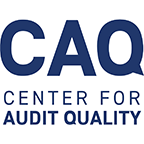Directorship Online
Oversight of the Independent Auditor
Understand the practicalities of working with an audit firm for effective financial oversight.
Governance Surveys
Directorship Magazine

2025 Governance Outlook
The Future of the Audit Committee: How Effectiveness Can Enhance Trust
Rapid technological innovation. A new presidential administration and Congress. Geopolitical tension and escalating regional conflict. These are just a few of the challenges that public companies and their boards face as they look to 2025 and beyond. Despite the turmoil, the US economy has remained strong.
A fundamental component of a strong economy is investor trust in the US capital markets and the quality of corporate disclosures. Research conducted at the Center for Audit Quality (CAQ) found that investors specifically cite "the critical role of an independent audit committee that selects, hires, fires, and pays independent auditors." With public company audit committees today composed entirely of independent directors and with rigorous requirements for auditor independence, risks of conflicts of interests on the parts of both directors and auditors are minimized.
It is widely understood that audit committee effectiveness
Against this backdrop, boards should ask two key questions as they look to strengthen their organizations for the year ahead: 1) Is our audit committee effective? and 2) How do investors know if our audit committee is effective?
Key actions that audit committees can take in 2025 to strengthen audit committee effectiveness and enhance trust include these:
It's no secret that as the regulatory environment becomes more complex and public companies increasingly disclose new forms of information, audit committees are facing "scope creep."
Generative artificial intelligence (AI) is one area that audit committees must monitor in 2025 and beyond. Over 40 percent of S&P 500 companies mentioned AI in their most recent annual filings to the SEC. And a recent joint CAQ survey found that 33 percent of audit committee respondents said that finance transformation is among their audit committee's top three priorities for the next 12 months.
The final US Securities and Exchange Commission (SEC) climate disclosure rule (though currently stayed) requires public companies to provide climate-related disclosures in their annual reports and registration statements beginning with annual reports in 2025. (Interestingly, 98% of the S&P 500 are already voluntarily reporting some of this information.)
According to the 2024 Audit Committee Practices Report, conducted by the CAQ in partnership with Deloitte's Center for Board Excellence, these topics and others like cybersecurity are now regularly showing up on many audit committee agendas.
Therefore, the audit committee members should be intentional in adapting and evolving their skill sets to be consistent with their evolving oversight responsibilities:
Managing scope creep is important to ensure audit committee effectiveness. Having a focused work plan can help audit committees meet their primary objectives and balance their workload.
Some audit committees are regularly assigned oversight of emerging risks—in other words, the "kitchen sink" approach, as described in the report, Audit Committee: The Kitchen Sink of the Board. This can be suboptimal if the committee lacks sufficient bandwidth.
To prevent this, audit committees may need to consider situations where it makes sense to push back on the board, asking if the matter requires board-level attention, and, if so, if the audit committee is the best place to oversee it. Answers can come from a comparative review of all committee charters and calendars—conducted under the auspices of the nominating and governance committee.
As new disclosure requirements crowd audit committees' agendas, there is an opportunity to consider the role that assurance services provided by the independent, external auditor can play. Such services can increase the reliability and value of information for investors and audit committee members.
Public company auditors can and should play an important role in the next era of corporate reporting. Not only must auditors meet stringent professional requirements, including continuous technical training to perform an audit or attestation engagement, but they must also operate under a sturdy framework of SEC and Public Company Accounting Oversight Board (PCAOB) regulations and standards. While private companies may not be subject to the same level of regulatory scrutiny as public companies, they can still benefit from the same key considerations/questions.
As audit committees tackle their evolving agendas, they should consider asking their external auditor the following questions:
Audit committees should also utilize resources available to help them navigate new disclosure areas. The CAQ offers resources for the audit committee in areas like generative AI, and the PCAOB also offers insights and resources for audit committee members.
In discussions with the CAQ, investors continue to provide the same answer about their expectations for audit committees: they want more transparency, but with context.
Specifically, investors want more transparency in the form of disclosures related to the audit committee oversight process. In partnership with Audit Analytics, the CAQ conducts an annual analysis, the Audit Committee Transparency Barometer, that examines disclosures among S&P 1,500 companies. The 2024 results show that audit committees have made improvements in disclosures over the past decade, but room for improvement remains.
Findings for S&P 500 companies:
Investors have shared with the CAQ that they want more than boilerplate disclosures—they want information that will help them understand the audit committees' responsibilities and processes.
Audit committees should consider how they can seek feedback from investors to evaluate whether their disclosures align with investor expectations. Two additional opportunities for audit committees to increase transparency are direct conversations between investors and audit committee chairs and enhanced audit committee reports, with details on not only what areas audit committees are overseeing but also how they are doing so.
By adopting the practices recommended, audit committees can reinforce investor trust and ensure that their organizations are well equipped to navigate a complex and shifting landscape in 2025 and beyond. This strengthened focus on trust and transparency not only will support investor confidence but also will help boards effectively manage and respond to emerging disruptions.
Vanessa Teitelbaum, CPA, is senior director on the Professional Practice team at the Center for Audit Quality. She joined the CAQ in 2016 and advocates for stakeholders in the audits of public companies.
About the Center for Audit Quality (CAQ)
The Center for Audit Quality is a not-for-profit think tank and the recognized leader—inside and outside of the auditing profession—on all things public company auditing: resource provider, thought leader, and convener.

This article is part of the 2025 Governance Outlook report that provides governance insights for the year ahead.
Discover More
